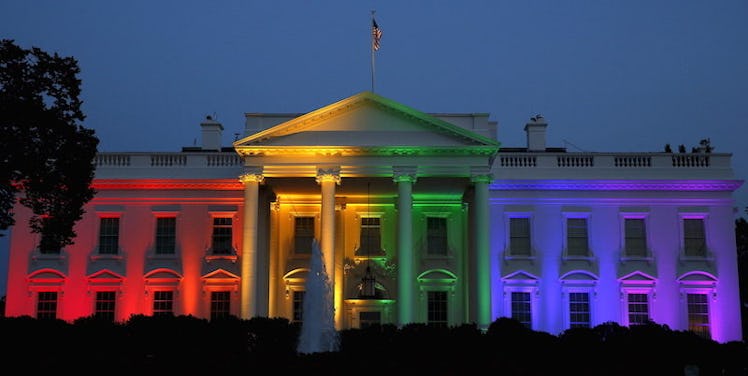
How To Get Involved If You're Worried About LGBTQ+ Rights Under Trump
Donald Trump won the presidential election on a campaign of fear and hatred.
This has made many supporters of LGBTQ+ rights worried for the protection of those rights.
The Republican party is generally less open to LGBTQ+ rights than the Democratic party.
Trump's running mate, Mike Pence, has one of the worst records on LGBTQ+ rights. He is against same-sex marriage, legalized discrimination in Indiana and has supported conversion therapy.
During "60 Minutes" on Sunday, Trump said same-sex marriage is "settled" and he won't try to disrupt it. But there are lots of other things his administration can do (including nominating a conservative Supreme Court justice).
And already attacks have been made against the LGBT community since Trump was elected.
If you're worried about what will happen to LGBTQ+ rights under Trump, there are things you can start doing right now.
Educate yourself on your state laws.
Same-sex marriage is legal nationally.
But many other laws vary state by state.
Stephen Peters, national press secretary of the Human Rights Campaign, told Elite Daily,
LGBTQ people are at risk of unfair and unjust discrimination because there are no local non-discrimination laws protecting them in the workplace, in housing and in public accommodations.
If you want to check out your local laws, you can use this handy map from the HRC.
Call local politicians.
Once you know what's going on in your state, you'll know what needs to be changed.
Don't just get mad about it. Call your elected officials and tell them you want these discrimination protections put into place.
Peters said,
We also expect anti-equality activists to push a host of anti-LGBTQ legislation in states across the country this year. In order to stop them, it's crucial that your readers contact their lawmakers and demand these bills be defeated.
You can also call your representative in Congress to tell them you want LGBTQ+ rights supported.
Volunteer with an organization or hotline.
Use your skills for good. Check out local organizations and see if there are ways you can be of use, like by running websites and social media or doing paperwork and research.
LGBTQ+ violations obviously affect a range of people of various ages and circumstances in very personal ways. You can volunteer to be a mentor or answer phones at a crisis hotline.
Speak up.
There's a possibility there will be an increase in verbal and physical attacks against the LGBTQ+ community. If you see something happening, be an active witness.
If your friend makes a homophobic joke, say something about it. Call people out if they're spreading hate and discrimination.
Use your voice to show that you support the LGBTQ+ community. That's important.
Check out these organizations.
The HRC has had "tens of thousands of new members and supporters join us since the election," Peters said, which is super helpful.
Check these organizations out and see what options they have for donations and volunteering:
- Human Rights Campaign (advocates and organizes)
- American Civil Liberties Union (behind the legal cases)
- The Trevor Project (network for crisis and suicide prevention)
- Transgender Legal Defense & Education Fund (advocates legally and helps with name change process)
- PFLAG [Parents, Families and Friends of Lesbians and Gays] (advocates, with local organizations)
- National LGBTQ Task Force (organizes activists)
- It Gets Better (supports youth)
- The #TransLawHelp on Twitter connects trans people to attorneys
Vote.
The next national election is the 2018 midterms. Don't miss it.